|
Part 1 first showing Mon 20th October 2007, 8pm,
Part 2 first showing 3rd November 2007
Without commercials, each part is about 40 minutes
Film 24 (UK satellite)
Narrator: At five, a character who's changed shape more
times than Gerry Halliwell.
Directed by Stephen La Riviere, narrated by Alastair Lock.
Part 1 titles use the Space 1999 year 1 theme with the Matter
Of Life And Death This Episode sequence appearing in the top
right corner. Part 2 (which opened with the UFO theme) contained
a segment about Space 1999.
Gerry Anderson: [UFO] went very well in America. It went
into syndication. The two most important markets in America are
New York and Los Angeles and it led both those territories for 17
consecutive weeks.
Because UFO was doing so well in America, I had a call from
Lew [Grade] to say quick, quick, roll on and make a new series.
So I thought if we're going to make a second season,
we're going to make some improvements - "yeah, yeah,
whatever you think, Gerry". So I started to make the show at
another studio. And as we were developing it, one of the guys in
America - I wasn't particularly fond of him, I have
to say - phoned Lew and said, "Listen, the ratings are
dropping on UFO". We made 26 shows, they ran for 17 weeks leading
the country, but because they dipped, cancel the second
season.
Gerry Anderson: We spent a lot of money and effort building
a new sky base [sic] which was much bigger than the one we had in
the first season, we made new uniforms and so forth and so on. I
said, you decided not to pursue with the second series. what if I
take all the material I've got, and turn it into a new
show. He said great idea, do it. Well, I got a call from this guy
in America, who shall remain nameless, but he was a thorn in my
flesh. He was able to get around Lew because he was able to say,
"Lew, the Americans won't understand that", and "Lew, the
Americans like that". He called me, and he said, "Gerry, I
understand Lew has given you permission to turn this into a new
show". I said yes. He said "okay, you want my backing?" I said
obviously. He said, "well, here's the deal. I don't
want in this new series for you to have one single show that
takes place on Earth". So I said why, the episode when
Straker's kid was killed was a wonderful episode, everybody
loved it. "I'm telling you that it's not the kind of thing
that an American audience want to see". And he said, "let me make
it simple for you, unless you do as I say, I'm going to
pick up the phone and say to Lew, my recommendation is that you
shouldn't go ahead with this". So I said, "okay, let me
call you back". I went to bed that night, thinking, thinking,
thinking. I got up the next morning and I phoned this guy, and I
said, "look, I've got an idea. I will shoot every episode
on the moon-base, it'll stay on the moon right the way
through". He said, "that's not good enough, I know you
Gerry, no-one prevents you making the show on Earth". Okay, I put
the phone down. I had an idea. I phoned him, and I said, "What if
I blow the moon out of orbit, with everybody on board?" He said,
"okay, you've got your show".
[Y1 title cards: Landau, Bain, Space 1999]
Gerry Anderson: We negotiated with Martin Landau and
Barbara Bain. At first we met with them, showed them a feature
film I had made, and they were very keen to do the series. Then
their agent stepped in, and said if you want these two you do not
talk to them again until you've signed a contract. Lew had said
to us, "look I've gone along with it all this time, but not a
penny more". So we were sunk. We were sitting by the pool, and
Abe Mandell said to me, "Gerry, it's five o'clock here, so it's
eleven o'clock in London. And Lew always goes to bed at nine and
we daren't ring him. But how can we let the series go down?" And
then suddenly he stood up and said, "To hell with it, I'm going
to ring Lew." [cut[ And then I heard it- brr, brr. I thought he's
a brave guy. I heard Lew's voice, "Hello"... He said, "Lew, I've
got Gerry for you" and he put the receiver in my hand. (laughs) I
thought it was just about the dirtiest trick I've ever known.
But, good old Lew, he didn't get annoyed with me, I was able to
say, this is positively the last thing, if you let us do this,
we've got them. And he said, "okay, fine".
[Yr 1 titles: the lunar surface explosion and Breakaway This
Episode sequence]
Gerry Anderson: Martin Landau presents himself with a
California tan, which makes him look handsome and tough. Barbara
Bain presents herself as being all pale and interesting.
[clip from Breakaway: "That is not the kind of damage I'm
looking for"]
Gerry Anderson: So if you stand them together for a
two-shot, you got one with this dark tan and the other one's
white as a sheet. And of course the film contrast cannot cope
with that. And the graders you to phone up and say, "We can't do
this". We had a wonderful lighting cameraman, but every time
there's a two shot, we dreaded it.
Catherine Schell: I know that people want me to say bad
things about Barbara, but I... won't, because we had a very
civilized working relationship. I was told that there were
certain things she had in her contract, to do with my character,
to do with Catherine Schell. That I was never allowed to appear
as Catherine Schell, and there was one particular script where
that did happen. I was given a script to read, and Maya turns
into Catherine Schell, to tease Tony Anholt. And it was taken
out. Next time when I read the script, whoops, that scene was
gone. And there were other things that I noticed as well that I'm
sure was possibly part of Barbara's contract. The ending of every
episode, there's a freeze frame, a close up, of whoever it was
on, so it was on Nick, it was on Zienia, it was on Barbara, it
was on Tony, it was on Martin, it was never on me.
Narrator: The ending of the first series was a major
landmark in Gerry's life. After nearly twenty years his
relationship with Sylvia came to an end. It was the conclusion to
a successful working partnership, a not entirely successful
marriage, and the beginning of an acrimonious divorce that would
span five years.
Gerry Anderson: I was asked by Abe Mandell in New York if
we could use an American writer. Long story, but eventually I
said okay. And I met Fred Frieberger, who died recently,
unfortunately, who was a writer on the very first Star
Trek.
Catherine Schell: There was one funny story about Fred
Frieberger, that he did have a nick name, he was called the
Serial Killer, because he had actually done that to other
series.
Gerry Anderson: And he was a very, very nice guy, but he
was American. What I mean by that is, we have a different way of
thinking. Separated by a common language, as they say.
Catherine Schell: He was going out more towards the
adolescent age group. He felt that adolescents love monsters, so
we're going to stick monsters on the moon.
Gerry Anderson: He came up with ideas that I didn't really
approve of, I didn't like. But he was here, quote, unquote, to
satisfy the American audience, to make us highly saleable in
America. And shortly after he arrived - I got on very well with
him, he was a very nice guy- but I said to him, if you're going
to try to turn this show into something else in terms of
scripting, then I'm going to appoint you as the producer, because
it's only fair. If you turn the show around, at least that's what
you think you're going to do, and make it a huge success in
America, then you should be the producer, and if you make a balls
up of it, you're also be the producer.
[Clip of moon leaving Earth, title caption]
Narrator: True to the CV of a man where every entry began
"The last series of..", Fred Frieberger oversaw the second and
last series of Space: 1999. Space 1999 was the last sunset for
the team that had started work together as a small cottage
industry in Slough. The last members of the team who had worked
for Gerry for so long finally disbanded. Gerry's working
relationship with ATV came to an end after 17 years.
Gerry Anderson: When Space 1999 finished, the third world
war was breaking out at ATV. And there were people at work
undermining Lew. Lew became understandably preoccupied with
defending his position. So Lew didn't give me any shows at that
time.
|
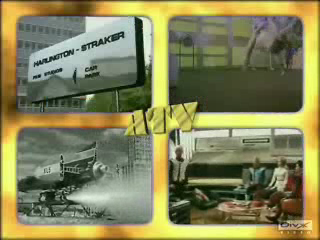
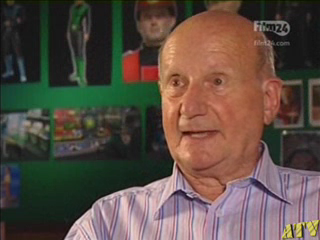
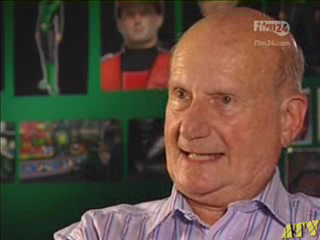
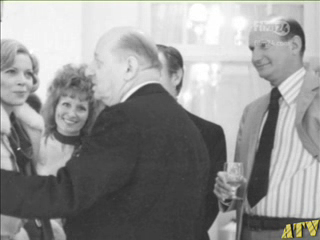
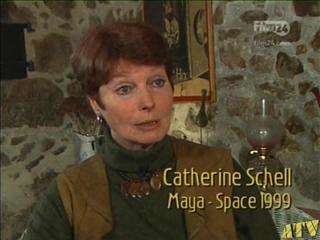
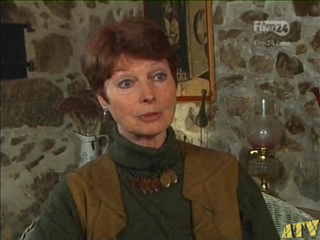
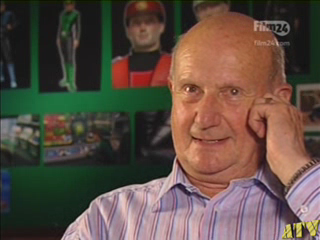
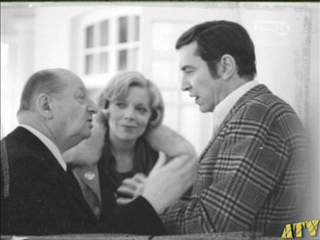
|







